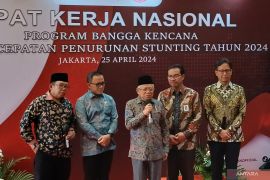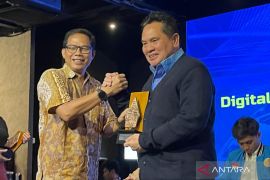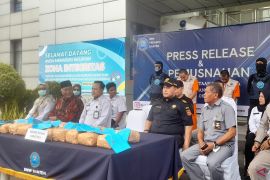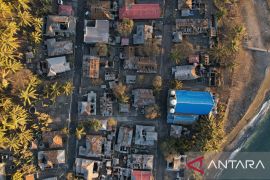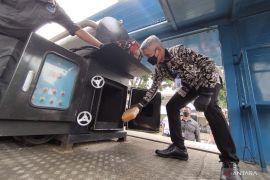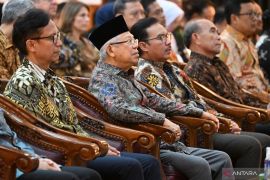President Joko Widodo, who over the past few years had celebrated the Lebaran festivities in vrious regions, is expected to perform his Lebaran prayers at Istiqlal Grand Mosque in Jakarta this year.
"The president is scheduled to conduct his Eid prayers in Jakarta, probably at the Istiqlal Mosque," State Secretary of the Cabinet Ministers Pramono Anung said at the Presidential Palace in Jakarta on Thursday.
Indonesian Muslims are now in the last week of the fasting month, and the Ramadan month will end next Saturday (June 24). This means that Muslims in Indonesia are now ready to welcome the Lebaran Day, a day during which Muslims of the world flock to the mosques, squares, and other open places to perform their Eid prayers and to offer their gratitude to the Almighty.
During the days of the fasting month, Muslims throughout the world undergo a spiritual cleansing by restraining from passion and abstaining from food and drinks from dawn until the sun sets.
The Lebaran Day, which is the happiest day for Muslims, is not to be construed as an exemption from duties that God imposes on us, but has to be understood in its deepest sense. It is not a mark for Muslims to remain free from religious duties and obligations, but a mark that they have to maintain what they have obtained during the period and have to keep on performing their religious obligations.
After fasting for the whole month, with a deep submission to the wish of God, Muslims come out free of sins. God grants forgiveness to those who consecutively fast on the days of the fasting month, because they undergo redemption by communing with God with a deep submission.
To understand the essence of the Lebaran Day, which falls on the first day of Syawal, as the expression of their gratitude to the Almighty God, the Muslims in big cities, small towns, and remote areas head to the mosques, fields, and other squares in droves to echo the magnificent name of God, namely Allah Akbar.
It is also on this day when uncountable angels from heaven line up on the road sides to welcome and pray for compassion for the Muslims who head to proclaim the greatness of God during Eid.
The Lebaran Day or Lebaran feast is essentially not a ceremonial day, but in real terms, it bears religious significance which is beneficial for building up the mental and spiritual attitude. In other words, it contains religious values that link people with their Creator as well as community values that harmonize the relations among the people.
It has been a tradition that Muslims in Indonesia, in highlighting the event of the Lebaran Day, celebrate it with various communal activities such as Halal-bi-Halal (post-fasting gathering to exchange apology) and reciprocal visits that are carried out not only among Muslims but also among non-Muslims. This reflects good tolerance among believers of different faiths in Indonesia, whose ideology is Pacasila (five-pillar philosophy).
The Lebaran festivities, therefore, provide spaces and opportunities to implement the principles of Pancasila, which is to establish cordial relations among human beings horizontally, as manifested in the Halal-bi-Halal tradition. It also builds direct contact among individuals with their Creator, which is the vertical relation with God, as manifested when Muslims recite their prayers. That is the most fundamental essence of the Lebaran Day that Muslims have to realize.
Now, the Lebaran Day, which comes only once a year, is coming up to bring fortune. Muslims should welcome it with determination to develop their relations both with God and with human beings for their happiness, as guided in the Pancasila state ideology.
After all, Chairman of the Peoples Consultative Assembly (MPR) Zulkifli Hasan believes that by implementing the values of Pancasila in daily life and making it the basis for policy making, it will serve as a tool for community groups to prevent discrimination against one another.
Therefore, the values of Pancasila should be applied in daily life as a unifying tool of the nation. "Hence, I urge the community to not make Pancasila as a stigma to discriminate against each other. It will cause disunity. Pancasila should become the basis for unifying the nation," he explained.
This weekends Lebaran festivities will serve as a momentum to build the nations cohesiveness through practicing the essence and values of the Ramadan fasting month.(*)
Reporter: Andi Abdussalam
Editor: Heru Purwanto
Copyright © ANTARA 2017
